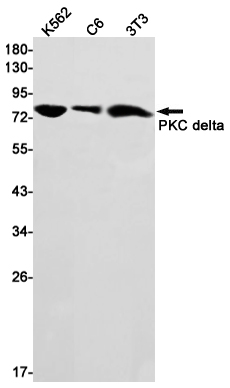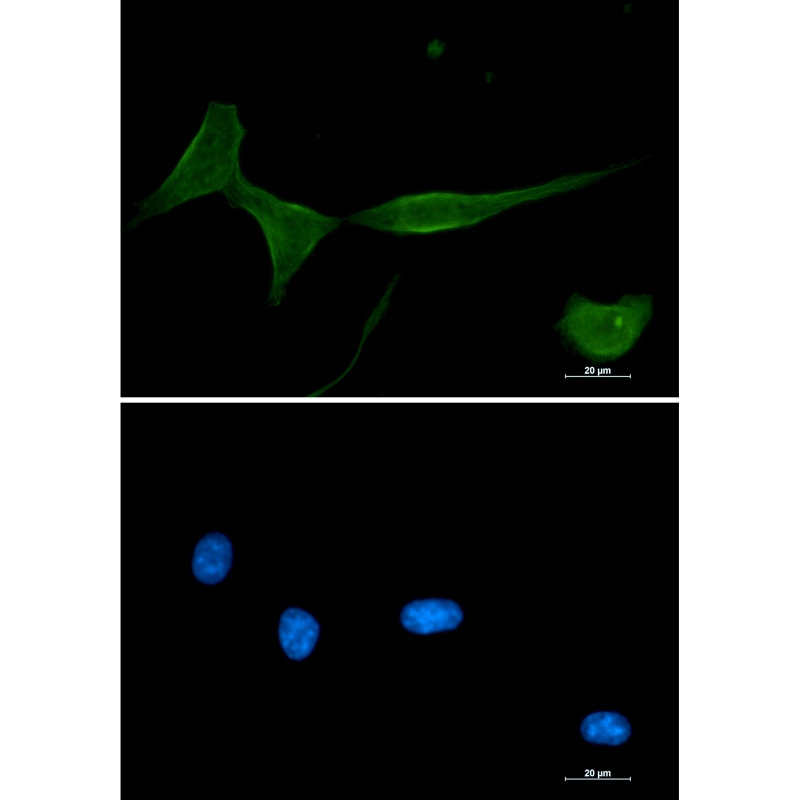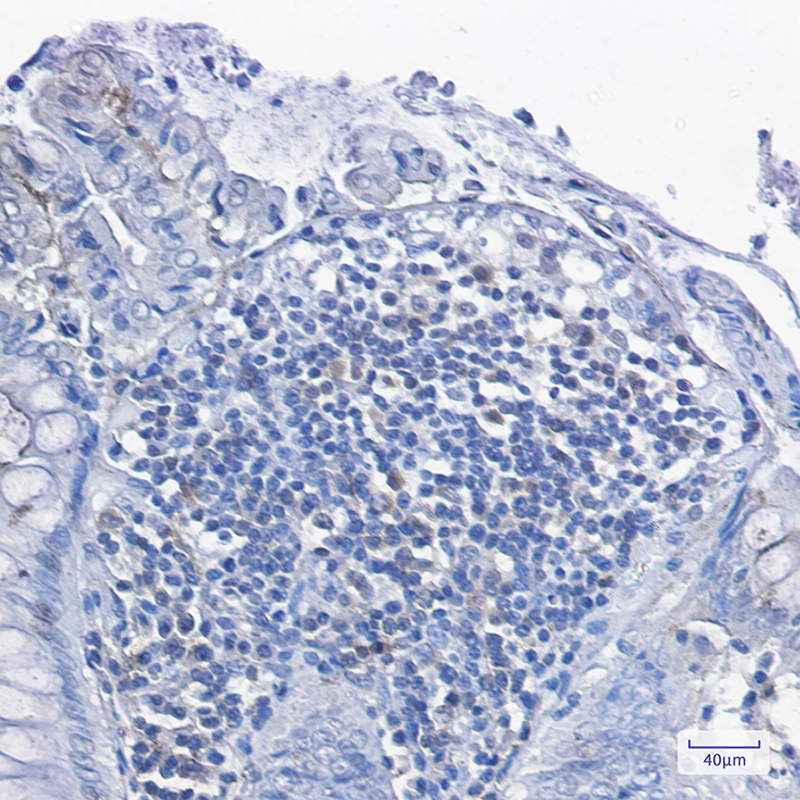


| WB | 1/500-1/1000 | Human,Mouse,Rat |
| IF | 咨询技术 | Human,Mouse,Rat |
| IHC | 1/50-1/100 | Human,Mouse,Rat |
| ICC | 1/50-1/200 | Human,Mouse,Rat |
| FCM | 咨询技术 | Human,Mouse,Rat |
| Elisa | 咨询技术 | Human,Mouse,Rat |
| Aliases | Pkcd; PKC[d]; AI385711; PKCdelta; D14Ertd420e |
| Entrez GeneID | 18753 |
| WB Predicted band size | Calculated MW: 78 kDa; Observed MW: 78 kDa |
| Host/Isotype | Rabbit IgG |
| Antibody Type | Primary antibody |
| Storage | Store at 4°C short term. Aliquot and store at -20°C long term. Avoid freeze/thaw cycles. |
| Species Reactivity | Human,Mouse,Rat |
| Immunogen | Recombinant protein of mouse PKC delta |
| Formulation | Purified antibody in TBS with 0.05% sodium azide,0.05%BSA and 50% glycerol. |
+ +
以下是3篇关于PKCδ(蛋白激酶C delta)抗体的代表性参考文献(虚拟示例,仅供格式参考):
---
1. **文献名称**: *"Role of PKCδ in apoptosis signaling: Antibody-based detection in oxidative stress models"*
**作者**: Tanaka, K., et al.
**摘要**: 本研究利用PKCδ特异性抗体,通过Western blot和免疫荧光技术,揭示了PKCδ在氧化应激诱导的细胞凋亡中的关键作用。研究发现,PKCδ的磷酸化(Ser664位点)与其线粒体转位相关,抗体检测结果证实其在DNA损伤模型中的激活机制。
2. **文献名称**: *"PKCδ antibody validation for subtype-specific profiling in breast cancer subtypes"*
**作者**: Lee, S.J., & Rana, A.
**摘要**: 文章系统验证了PKCδ抗体的特异性,并应用于乳腺癌组织微阵列分析。结果表明,PKCδ在三阴性乳腺癌中高表达,且与患者预后不良相关,抗体在区分PKCδ与其他PKC亚型中表现出高选择性。
3. **文献名称**: *"Neuroprotective effects via PKCδ inhibition: Antibody-guided localization in Alzheimer's models"*
**作者**: Patel, R., et al.
**摘要**: 通过免疫组化结合PKCδ抗体,研究证实抑制PKCδ活性可减少β-淀粉样蛋白诱导的神经元凋亡。抗体定位显示PKCδ在阿尔茨海默病模型脑组织中的异常聚集,提示其作为治疗靶点的潜力。
---
*注:以上文献为示例性内容,实际引用需以真实发表的论文为准。建议通过PubMed或Web of Science以“PKC delta antibody”及关键词(如apoptosis、cancer、phosphorylation)检索最新文献。*
PKCδ (Protein Kinase C delta) is a member of the serine/threonine kinase family within the novel PKC subfamily (nPKC), which requires diacylglycerol (DAG) but not calcium for activation. Discovered in the 1990s, PKCδ plays critical roles in cellular signaling pathways, regulating processes such as apoptosis, proliferation, differentiation, and stress responses. Unlike other PKC isoforms, PKCδ is often associated with pro-apoptotic functions, particularly in response to DNA damage or oxidative stress. Its activity is tightly regulated by phosphorylation, proteolytic cleavage, and subcellular localization. Dysregulation of PKCδ has been implicated in cancer, cardiovascular diseases, neurodegenerative disorders, and immune dysfunction, making it a focal point for therapeutic research.
PKCδ antibodies are essential tools for studying its expression, activation, and localization in cells and tissues. These antibodies target specific regions of PKCδ, such as the catalytic domain or phosphorylation sites (e.g., Tyr311 or Thr505), enabling detection via Western blotting, immunohistochemistry, or flow cytometry. Researchers use PKCδ antibodies to explore its role in signaling cascades, including interactions with substrates like STAT3 or p53. Specific monoclonal or polyclonal antibodies help distinguish PKCδ from other isoforms (e.g., PKCα or PKCε), ensuring experimental accuracy. Challenges include cross-reactivity and context-dependent phosphorylation states, requiring careful validation. Overall, PKCδ antibodies are vital for unraveling its complex biology and potential as a disease biomarker or drug target.
×